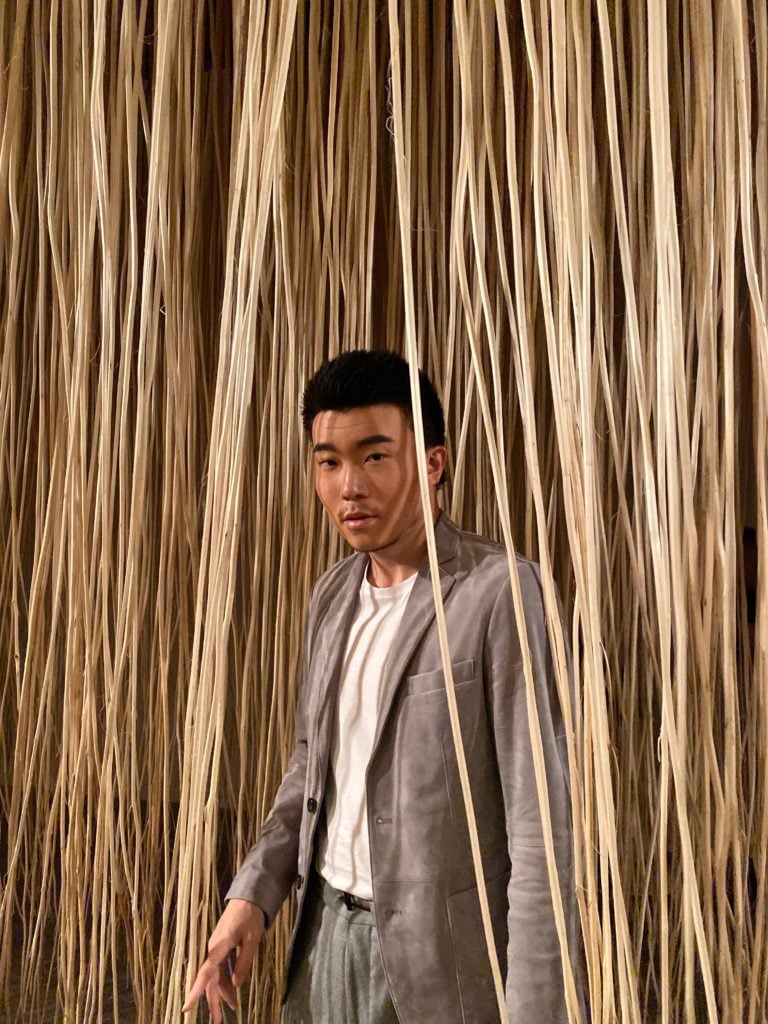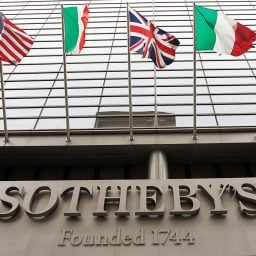An explosive lawsuit filed in Florida has exposed the behind-the-scenes wheeling and dealing that can take place when wealthy art buyers are competing for access to in-demand contemporary artworks.
The case, which was filed almost a year ago and settled on Wednesday, pitted Michael Xufu Huang, a prominent young Chinese patron who founded the X Museum in Beijing, against Monaco-based Argentine collector Federico Castro Debernardi. Huang sought $1.3 million from Debernardi for reputational damages.
The two started out as friends and colleagues, with Huang offering to buy work by sought-after artists under his own name and the guise of acquiring them for his museum. Instead, Huang transferred them to Debernardi with a 10 percent markup.
The deal would be illogical in almost any other market. Why would someone pay a 10 percent surcharge to an intermediary for something they could afford to buy directly from the seller?
The reason, of course, is that in the art market, one person’s dollar is not as good as another’s. Galleries serve as gatekeepers that control access to their artists’ works, and they often favor collectors who have founded their own museums, where the art presumably will be well cared-for long-term.
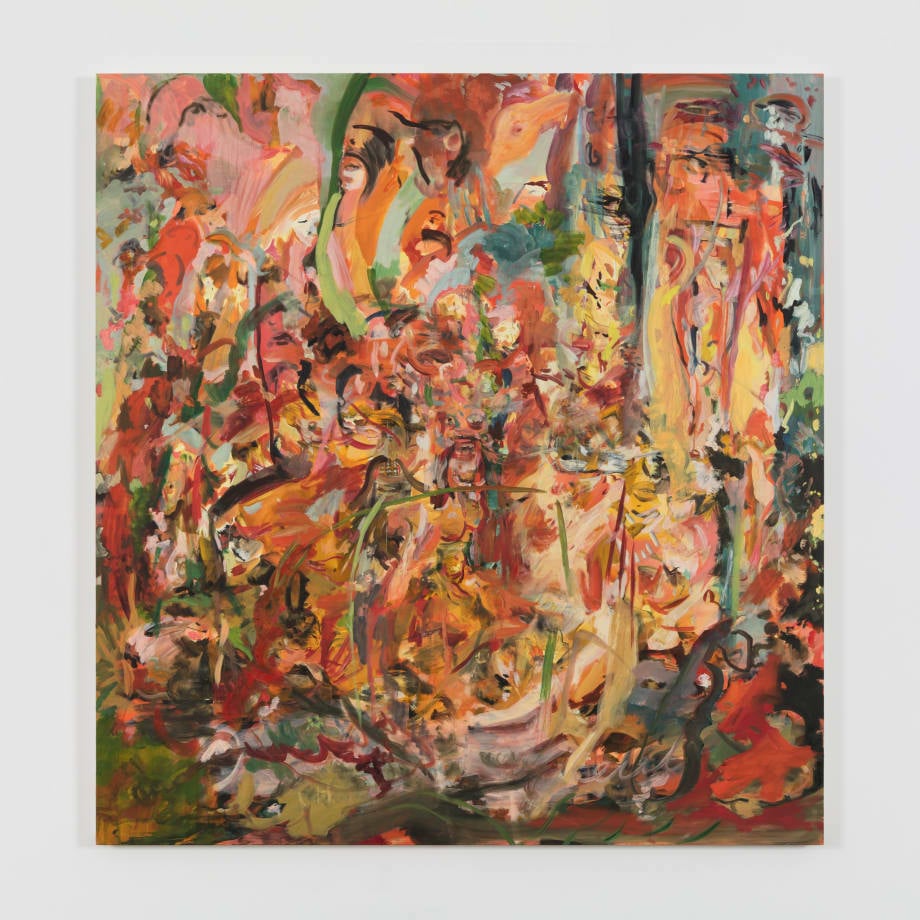
Cecily Brown, Faeriefeller. Image via Art Basel Miami Beach website.
Things between Huang and Debernardi started to fall apart in August 2020, when the Chinese collector sent his friend the following panicked message: “WTF??? Paula Cooper just emailed me this.” The gallery said it was troubled to learn that a painting Huang had purchased from them at Art Basel Miami Beach in 2019—a canvas by art star Cecily Brown—had been resold.
That was, indeed, a problem. The sale agreement that Huang had signed came with conditions, notably that he not “flip” or sell the work for a minimum of three years without at least giving the gallery right of first refusal.
Huang had bought the Brown painting for $700,000 on behalf of Debernardi. In exchange, Debernardi paid him a ten percent commission ($70,000) in addition to covering his $5,000 travel expenses.
That wasn’t the last time the painting changed hands, either. By the time Huang made the final payment to Paula Cooper, the work had already gone through Debernardi and found its way to the blue-chip gallery Lévy Gorvy, which sold it in March 2020, court documents show.
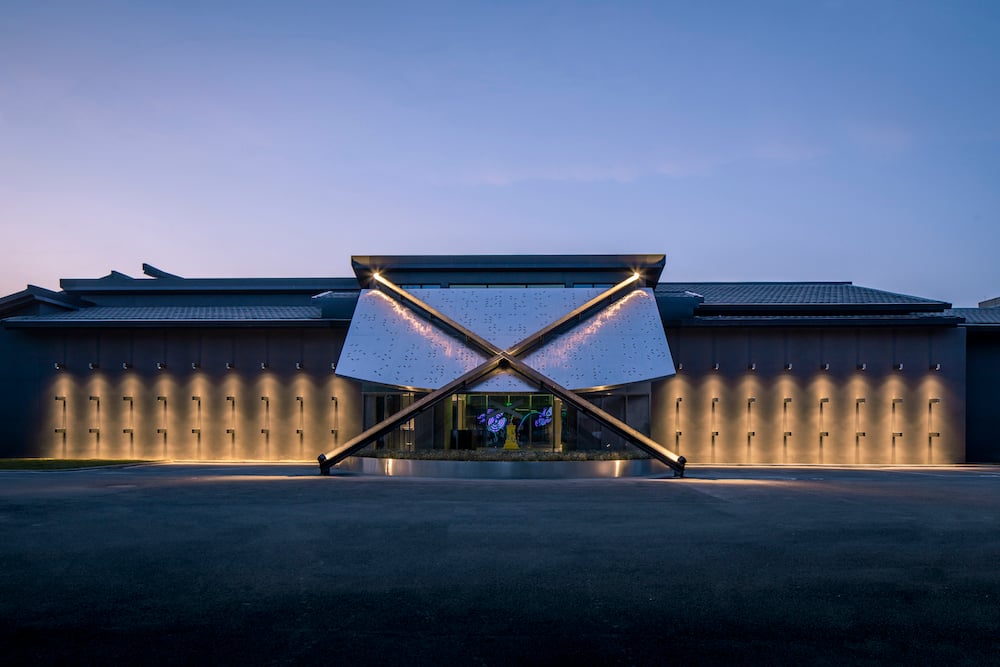
The X Museum in Beijing, Image courtesy X Museum and Guanqi Kim.
When Paula Cooper found out about the sale, the gallery told Huang that they were prepared to file a lawsuit seeking damages of between $500,000 to $1 million for his alleged violation of the agreement. “Media attention can be expected,” they wrote. “Your actions and the various statements you have made to us will become widely known.”
That’s when alarm bells started going off for Huang. Text messages he sent to Debernardi, included as exhibits in the lawsuit, show him demanding answers. Debernardi’s responses were casual and dismissive.
“I’m not taking this shit… I did nothing wrong,” wrote Huang.
“Clearly you don’t care about my reputation,” he added later, “when I did nothing wrong but simply getting you the work because you love Cecily Brown.”
“Forward me that email and let’s stop the drama,” Debernardi replied.
According to Bloomberg, which first reported on the case, Huang privately settled with Paula Cooper for an amount “way over the ten percent I made” from the commission. “It was my fault for letting this happen, so I paid it and took responsibility,” he told Bloomberg.
The timing of the revelations is unusual. The lawsuit was first filed in March 2021, almost a year ago, and the two sides agreed to a settlement just hours after the Bloomberg story broke. (The paperwork has not yet been filed.)
“We are pleased that the parties have reached an agreement in principle to resolve this case, which resulted from a misunderstanding between Mr. Huang and Mr. Castro Debernardi,” Huang’s attorney Wendy Lindstrom told Artnet News in a statement. “They look forward to collaborating again in the future.”
Attorney Luke Nikas, who is representing Debernardi, reiterated a statement he made to Bloomberg before the settlement was reached. “Mr. Debernardi acted in good faith from the very beginning: he had absolutely no intention of selling the artwork when he acquired it, and he transferred the work at the outset of the world-wide COVID-19 crisis in circumstances that the court will find to be completely appropriate,” he said.
The written agreements between Huang and Debernardi are specific and detailed. Neither would disclose Debernardi as the true buyer to any third party. Should Debernardi decide to sell one of the works, he would give Huang right of first refusal. Debernardi also agreed to lend any of the works to Huang’s museum when needed.
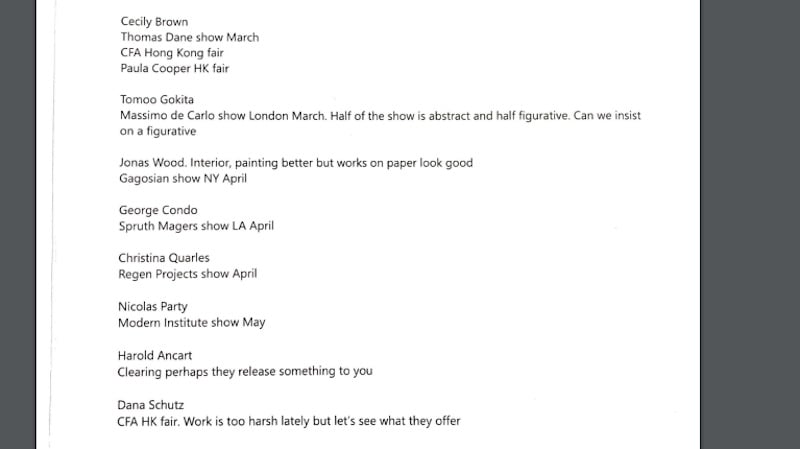
A “Wish List” of artworks that Federico Castro Debernardi emailed to Michael Xufu Huang in February 2019 was attached as an exhibit to the lawsuit.
Over the course of their relationship, Debernardi supplied Huang with a so-called “wish list” of hot artists he wanted Huang to track down on his behalf. The lawsuit also outlines two earlier deals in which Huang acquired works for Debernardi: Nicolas Party’s Two Faces (2018) for €60,000 (plus a €6,600 commission for Huang) and Harold Ancart’s Untitled (2019) for $220,000 (plus a $22,000 commission).
Party’s gallery Hauser & Wirth and Ancart’s gallery David Zwirner did not immediately respond to requests for comment. The contracts included in court filings do not specify where or how Huang originally acquired the two works.
Asked what happened to the Brown painting following the transfer to Debernardi, Huang told Artnet News: “I also don’t know. I was just left in the dark pretty much the whole time.”
A source familiar with the case said the Brown had already passed through several hands by the time it got to Lévy Gorvy, which facilitated the sale on behalf of a major auction house.
“While the gallery has no comment on the litigation between Mr. Huang and Mr. Debernardi,” Paula Cooper director Steven Henry told Artnet News, “we are glad to see growing awareness that resale contract clauses can be effective tools to help protect an artist’s career.”
Huang, who cofounded the Beijing museum M WOODS in 2014, launched the X Museum in 2020. It has presented exhibitions by high-profile contemporary artists including Christina Quarles (who happened to be a name on Debernardi’s wish list) and Issy Wood.
Huang may also be familiar to those who followed the case of convicted con artist Anna Delvey, who convinced him to cover her hotel room during a visit to the Venice Biennale. (He is a character in the upcoming Netflix series on the scandal, Inventing Anna.)
Whether the Debernardi debacle will make dealers reluctant to sell to Huang in the future, or whether their memories will be short, remains to be seen. But one private dealer said: “Michael is toast. Burned.”
